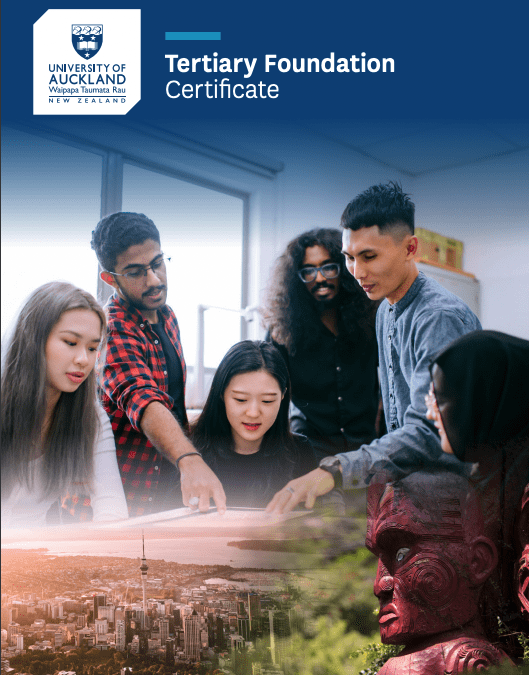TFC was not my first choice, but it is my best choice. I moved to New Zealand after sitting for my O-Levels in Malaysia because A-Levels (Year 13 equivalent) are optional (for Malaysia) and my school did not offer them. The programme also takes 2 years, so I wanted to earn my university entry credits by enrolling in Year 13 in NZ. However, there was this massive kink in my plans. COVID-19. My O-Levels were postponed from December 2020 to March 2021 and I was not able to enter New Zealand until early May 2021. This meant that it was too late for me to enrol in secondary school. I thought that I would have to wait for another 6 months, but then I discovered the University of Auckland’s Tertiary Foundation Certificate Programme.
TFC’s Enrollment Process
1. Application
The first thing you have to do is to apply for TFC. Remember that this programme is mainly for NZ citizens and Permanent Residents. Other than that, there were not many criteria, but I suggest you double-check before applying. Nothing is worse than applying with high hopes and then getting rejected because you do not fit the requirements. Also, make sure you want to go down this pathway because it is quite an intensive course with the sole intention of getting into your desired courses.
Apply following the steps in the TFC Handbook at:
https://www.auckland.ac.nz/en/study/study-options/undergraduate-study-options/preparation-and-foundation-programmes/tertiary-foundation-certificate/tfc-overview.html
Alternatively, the same info can be found on the TFC webpages:
2. Admittance Test
I was worried about this section because I was unsure whether the math I was taught and practised in Malaysia was the same as the math here. (But let’s be honest, maths is the same everywhere) Before the test, there will be some forms to fill, and it is just for them to understand why you are going for TFC and what pathway you intend to apply for. They must know this information to enrol you into the appropriate classes to get the credits you need to enter first-year courses.
Please don’t stress about this; it is not like an exam or a test. It was more like an evaluation to see the suitability of TFC for you. It only included Maths and English. I only had three mistakes for Maths, so it must have been pretty straightforward. You’ll pass with flying colours if you know how to write a short essay, answer questions with proper grammar and punctuation, and revise basic maths. (I suggest brushing up on some simple algebra and some calculus before the test)
3. Interview
Another thing I was worried about was the interview, but I shouldn’t have because it was quick and easy. For most people the interview is only around 15 minutes. It’s basically just a conversation to find out about you. The interviewer asked about my living situation and whether I needed transport assistance. Additionally, they wanted to know whether I had the proper electronics to have online classes if we went into lockdown….again. They will confirm the pathway you wish to take with you, and if you are applying for Semester Two, they will give you a fast-track option. For me the interview was only around 5 minutes.
You’re in. What’s next?

1. Focus on Yourself.
Typically, TFC is your second chance to enter the courses for the degree you want, so you need to ensure that you take full advantage of it. Remember that TFC is not a competition. Sure there will be scholarships for those who get the highest marks in specific subjects like Chemistry, but if you are doing your best, you are already in the running for the awards. Some people think they know more than you, but don’t let them discourage you. They are not deciding the grades you will get; that’s all on you.TFC is not a competition, nor is it a race. It’s a programme that allows you to transition into higher education which many do not get. Make full use of it.
2. Be consistent
A teacher from high school once advised me that consistency is more important than being intelligent. Think about it, if you consistently get marks from completing all the assignments you have and do sub-par on the final exam, you will still be better off than scoring a 100% on the final but missing out on the 60% from the assignments. Make your own study assignment and set reminders for all your due dates. Simply passing the classes may not be enough if you want to get into Biomed or Engineering, you need to score well and have a GPA of 7 to be safe. I was told that I needed a GPA of 6 but it was not confirmed, so I always made sure that I had a GPA much higher than 6.
3. Take this opportunity to adapt to university life
Make friends with your peers because if you are in the same classes, there is a high chance that you are aiming to go into the same courses. I made many friends that I still talk to and see around in my classes although I am already in my first year! People say that one of the main reasons we go to university is to network and widen our social circle, so this extra time at university, it is a network advantage early on. TFC was the not-so-free trial that I got before entering my first-year university studies, so adapt to the life of a university student. This actually helped me greatly as I knew where most of the buildings are from TFC that I did not have to go class hunting and scramble to class or get lost when commuting from class to class.
That’s it! I enjoyed TFC and everyone that is involved with the programme is lovely. Feel free to leave any questions you have in the comment section below and I’ll be sure to answer them!

Could someone tell me the fees for Tertiary Foundation Certificate?
Hi Ray
Last year the fees were $7160. Here’s their webpage for fees and enrolment.
Best
TIW
Hi, Annabel, Thank you for posting this. I have applied for the TFC as well, and I will have the diagnostic exam by next month. I have left school for a long time, but not any further than quadratic, if you think that is enough for the exam or do you suggest preparing more, please? Thanks for your time.
I appreciate this write-up as a dude in the process of figuring out everything I need to know and do in university and as I apply for the TFC 🙂
I’m really happy it helped you!! 🥹